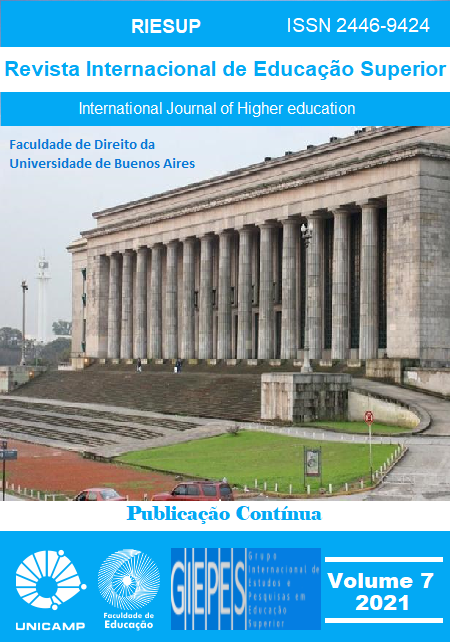Abstract
This report describes the experience that was developed in the discipline of Instrumental Methods of Chemical Analysis of the 4th semester of the Superior course of Technology in Food of a public institution in the countryside of RS. Different activities were used, planned in a sequential manner, and using different strategies and didactic resources: lectures-dialogued; thematic approach; search; planning and carrying out experimental activities; article writing and oral presentation. From the subjects covered in the expository classes and the perception about the social implications of Chemistry and technologies in their lives, the students suggested the theme water for human consumption and the methods of official analysis for conducting a bibliographic research. After that, the students did the collection and physical-chemical analysis of the water samples. Then, they presented the results in the form of an article, followed by an oral presentation. It was observed that the experience motivated and aroused interest in the subjects studied in the discipline and contributed to the learning and appropriation of knowledge. It is also worth noting that, unlike previous semesters, there was no failure due to lack of frequency or grade. Individual assessments, resourcefulness in carrying out laboratory activities, mastery and knowledge demonstrated during the presentation and discussion of results confirm this finding.
References
AULER, Décio; BAZZO, Walter Antonio. Reflexões para a implementação do Movimento CTS no contexto educacional brasileiro. Ciência & Educação, 7(1), p.1-13, 2001.
BRASIL. Fundação Nacional de Saúde. Manual prático de análise de água. 4 ed. Brasília, DF, 2013. Disponível em: http://www.funasa.gov.br/site/wp-content/files_mf/manual_pratico_de_analise_de_agua_2.pdf Acesso em: ago. 2018.
BRASIL. Ministério da Saúde. Portaria MS Nº 2914 de 12 de dezembro de 2011. Brasília,
DF, 2011. Disponível em: https://bvsms.saude.gov.br/bvs/saudelegis/gm/2011/prt2914_12_12_2011.html Acesso em: ago. 2018.
DEMO, Pedro. Educar pela pesquisa. 9ª ed. Campinas, SP: Autores associados, 2011.
GÜLLICH, Roque Ismael da Costa Investigação-Formação Ação em Ciências: um caminho para reconstruir a relação entre livro didático, o professor e o ensino. Curitiba: Editora Prismas Ltda, 2013, p. 115-126.
HUTCHINSON, John S. Teaching introductory chemistry using concept development. Case studies: interactive and inductive learning. University Chemistry Education, v.4, n. 1, p. 3-9,2000.
MARQUES, Mário Osório. Escrever é preciso: o princípio da pesquisa. 4 ed Ijuí/RS: Editora da UNIJUÍ, 2001.
NUNES, Márcia Menezes; MOTA, Ana Lourdes Arrais de Alencar; CALDAS, Eloisa Dutra. Investigation of food and water microbiological conditions and foodborne disease outbreaks in the Federal District, Brazil. Food Control v.34, p. 235-240, 2013.
PEREIRA, Régis S. Identificação e caracterização das fontes de poluição em sistemas hídricos. IPHUFRGS, v.1, n.1, p. 20-36. 2004.
PÉREZ, Leonardo Fabio Martínez. Ensino de Ciências com enfoque ciência, tecnologia, sociedade e ambiente (CTSA) a partir de questões sociocientíficas (QSC) In: Questões sociocientíficas na prática docente: Ideologia, autonomia e formação de professores [online]. São Paulo: Editora UNESP, 2012, pp. 55- 61. ISBN 978-85-3930-354-0. Available from SciELO Books.
ROTHBERG, Danilo. Aprender a aprender, educação superior e desenvolvimento moral. Psicologia USP, 17(2), 85-111, 2006.
SANTOS, Wilson Luiz Pereira dos; GALIAZZI, Maria do Carmo; JUNIOR, E. M. P. SOUZA, M. L. de. PORTUGAL, S. O enfoque CTS e a Educação Ambiental: Possibilidades de “ambientalização” da sala de aula de Ciências. In: SANTOS, Wilson Luiz Pereira dos; MALDANER, Otavio Aloisio. (Org.). Ensino de Química em Foco. Ijuí: Editora Unijuí, p. 131-157, 2010.
SILVA, Lenice Heloisa de Arruda; ZANON, Lenir Basso A experimentação no ensino de ciências. In: SCHNETZLER, Roseli Pacheco; ARAGÃO, Rosália M. R. de (Org). Ensino de Ciências: fundamentos e abordagens. Campinas: R. Vieira Gráfica e Editora Ltda., p 120-153, 2000.
SILVA, Roberto Ribeiro da; MACHADO, Patricia Fernandes.; TUNES, Elizabeth. Experimentar sem medo de Errar. In: SANTOS, Wilson Luiz Pereira dos; MALDANER, Otavio Aloisio. (Org.). Ensino de Química em Foco. Ijuí: Editora Unijuí, p. 231- 261, 2011.
SCHNETZLER, Roseli Pacheco. Concepções e alertas sobre formação continuada de professores de química. Química Nova na Escola, n.16, p. 15-20, 2002.
YANG, Kun; LEJEUNE, Jeffrey; ALSDORF, Doug; LU, Bo Rui; SHUM, C. K.; LIANG, S. Global Distribution of Outbreaks of Water-Associated Infectious Diseases. Neglected Tropical Diseases, v. 6, n. 2, p. 1483, February 2012.
ZUIN, Vânia Gomes; FREITAS, Denise de.; OLIVEIRA, Márcia R.G. de; PRUDÊNCIO, Christiana Andréa Vianna. Análise da perspectiva ciência, tecnologia e sociedade em materiais didáticos. Ciências & Cognição, 13(1), p. 56-64, 2008.

This work is licensed under a Creative Commons Attribution 4.0 International License.
Copyright (c) 2020 Revista Internacional de Educação Superior


